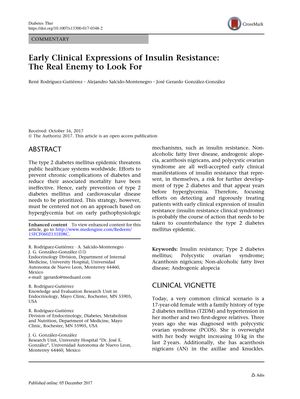TLDR Recognizing and treating early signs of insulin resistance can help prevent type 2 diabetes and improve life quality.
The article from 2017 highlighted the significance of recognizing and addressing insulin resistance (IR) early to prevent type 2 diabetes mellitus (T2DM). It identified conditions like non-alcoholic fatty liver disease, androgenic alopecia, acanthosis nigricans, and polycystic ovarian syndrome as early signs of IR, which precede the onset of hyperglycemia by years. The authors proposed that targeting these early signs, referred to as "insulin resistance clinical syndrome," with interventions such as exercise, diet, and possibly metformin, could be more effective in preventing T2DM than focusing on hyperglycemia. They argued that prompt and aggressive treatment of these early IR indicators is essential for reducing diabetes-related economic costs and enhancing the quality and length of life for those at high metabolic risk.
 9 citations
,
October 2014 in “Experimental and Clinical Endocrinology & Diabetes”
9 citations
,
October 2014 in “Experimental and Clinical Endocrinology & Diabetes” Knuckle Acanthosis Nigricans is common in Latin American youth and may indicate early insulin resistance, especially in those with normal weight.
 50 citations
,
December 2008 in “Clinical Endocrinology”
50 citations
,
December 2008 in “Clinical Endocrinology” Hair loss in young men linked to higher risk of insulin resistance and metabolic issues.
 September 2025 in “Cureus”
September 2025 in “Cureus” GLP-1 agonists may help treat certain skin conditions.
 52 citations
,
February 2018 in “Diabetology & Metabolic Syndrome”
52 citations
,
February 2018 in “Diabetology & Metabolic Syndrome” Some skin conditions may indicate metabolic syndrome, which could help with early detection and management of related health issues.
 45 citations
,
January 2013 in “Journal of Human Reproductive Sciences”
45 citations
,
January 2013 in “Journal of Human Reproductive Sciences” Women with PCOS are more likely to have fatty liver disease, especially if they have metabolic problems.
February 2024 in “IntechOpen eBooks” Proper nutrition can help manage PCOS symptoms and improve overall health.
 3 citations
,
March 2023 in “Life”
3 citations
,
March 2023 in “Life” Obesity can worsen wound healing by negatively affecting the function of stem cells in fat tissue.
 247 citations
,
August 2011 in “European Journal of Epidemiology”
247 citations
,
August 2011 in “European Journal of Epidemiology” The Rotterdam Study updated its design and objectives in 2012, providing insights into various diseases in the elderly, including skin cancer, bone health, liver disease, neurological and psychiatric conditions, and respiratory issues.








